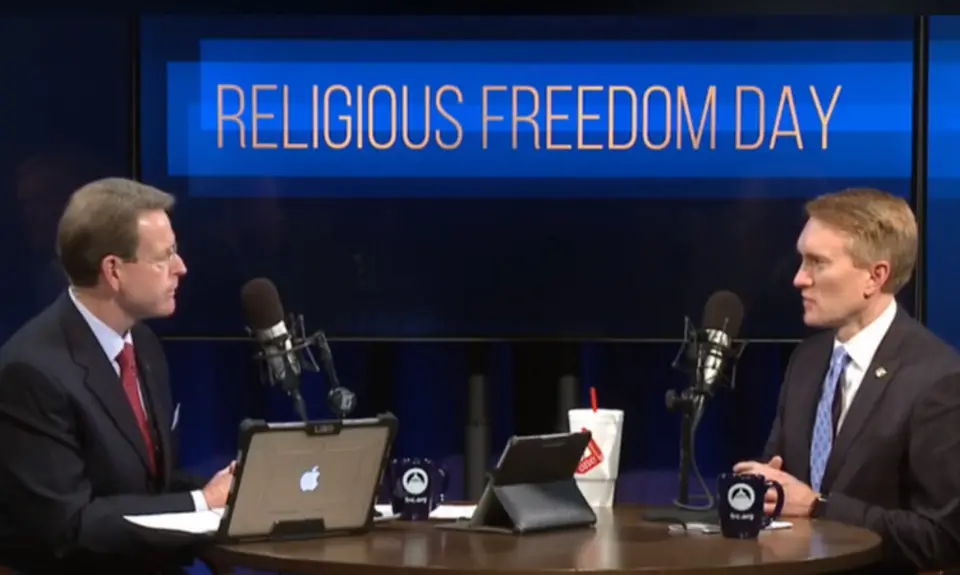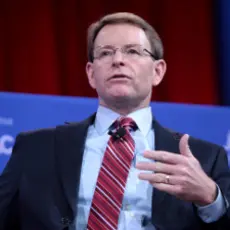Tuesday marked the first occurrence of Religious Freedom Day during the Trump presidency, and Religious Right groups used it to try to strengthen their efforts to own, distort and weaponize the American ideal of religious liberty.
Religious Freedom Day, celebrated annually on January 16, commemorates the 1786 Virginia Statute of Religious Freedom, which was written by Thomas Jefferson and served as a foundation for the First Amendment to the U.S. Constitution. It rejected the European and colonial model of government-established churches, protecting people from being forced to support “any religious worship, place, or ministry whatsoever.” As PFAW board member Khizr Khan noted in his Religious Freedom Day commentary yesterday, Jefferson was explicit in his autobiography that the Virginia Statute’s “protection of opinion was meant to be universal” and embraced “the Jew and the Gentile, the Christian and Mahometan, the Hindoo, and Infidel of every denomination.” In other words, as Khan says, “Religious freedom is for all of us.”
But Jefferson’s own words haven’t stopped some Christian nationalists from arguing that the First Amendment was only meant to prevent the government from playing favorites among Christian sects, or even claiming that the First Amendment’s religious freedom protections don’t apply at all to Muslims and other non-Christians.
One group that has tried to wrench Jefferson’s statute away from its historical moorings is the Family Research Council. This week FRC accused “liberals” of “blasting the tradition that honors the 1786 signing” of the statute. In Monday’s “Washington Update,” FRC President Tony Perkins said it’s only a “far-Left fringe” that disputes the claim that America was founded as a Christian nation.
Perkins even appealed to one of Religious Right “historian” David Barton’s most ridiculous arguments about the Constitution, which before the adoption of the First Amendment in 1791 mentioned religion only in a provision forbidding any religious test for holding public office. Perkins, echoing a frequent Barton argument, wrote, “Our own Constitution closes with the words, ‘In the year of our Lord, 1787.’ That's a reference to Jesus! The signers not only embraced Christianity, they anchored our most important document in it.” Anchored? With the date?
To mark Religious Freedom Day, FRC turned Perkins’ nightly “Washington Watch” radio show into a Facebook broadcast with a live audience at the group’s Washington, D.C., headquarters. Perkins’ guests were Oklahoma Republican Sen. James Lankford, former Virginia Republican Rep. Frank Wolf, Trump-boosting Religious Right activist Alveda King, and anti-abortion activist Ryan Bomberger. With the event coming the day after the national Martin Luther King Jr. holiday, Perkins and his guests tried to wrap themselves in King’s moral mantle.
Perkins and his guests mixed conversation about the real and often horrific persecution facing Christians and other religious minorities around the globe with the very different kinds of situations that they call persecution in the United States, such as the requirement under a state nondiscrimination law that a baker treat gay couples the way he treats other customers. Lankford warned that Americans’ ability to live their faith is “dwindling away” and Perkins warned that religious liberty in the U.S. could be lost if Christian conservatives fail to make a bolder and more courageous stand.
Wolf, a longtime advocate of religious liberty internationally, denounced American law firms for representing repressive regimes, but he said nothing about the fact that his FRC hosts and other Religious Right groups eagerly work with the world’s most religiously repressive regimes to enshrine anti-LGBTQ and anti-choice “traditional” views on sex, gender, marriage and family in international law.
Also this week, FRC promoted a seven-minute video it made in 2016, in which FRC’s Kenyn Cureton warns, “Modern courts and those who bow to their opinions are now infringing on our natural God-given rights. Our freedom to believe is under fire.” Laughably, the video starts with FRC vice president Jerry Boykin telling people to study the history of the First Amendment, noting pointedly that it protects freedom of religion, not merely freedom of worship. I say “laughably” because Boykin himself has demonstrated a deeply flawed understanding of the First Amendment. And he’s not the only one. We noted in 2016, “Perkins and his Family Research Council colleagues have not consistently advocated for religious liberty for people of all faiths”:
For example, when Religious Right groups were rallying opposition to the misnamed “Ground Zero Mosque,” FRC’s Ken Blackwell was among them. Perkins said just last month that banning Muslims from immigrating to the U.S. would not be imposing a religious test because “only 16 percent of Islam is a religion.” He has said that people are free to make their own theological choices, but that our nation was founded on “Judeo-Christian principles” and that “those who practice Islam in its entirety” will “destroy the fabric of a democracy.”
Retired Gen. Jerry Boykin, now FRC’s executive vice president, has also pushed the idea that Muslims do not deserve the protection of the First Amendment because Islam “is not just a religion, it is a totalitarian way of life.” On Bryan Fischer’s radio show in 2011 Boykin declared, “No mosques in America,” explaining, “A mosque is an embassy for Islam and they recognize only a global caliphate, not the sanctity or sovereignty of the United States.”
Perkins has even argued that Christians who support marriage equality for same-sex couples don’t have the same religious liberty protections as Christians like him because “true religious freedom” applies only to those with “orthodox religious viewpoints.” He has dismissed as “supposed Christians”those who support reproductive choice.
And Perkins has also criticized the military for accommodating “fringe religions” and suggested that it is not the government’s role “to try to put all religions on the same plane.”
David Barton’s Wallbuilders also sent out a Religious Freedom Day email this week. It described the Virginia Statute as “protecting religious rights for all denominations” and said Jefferson “had worked hard to protect and defend those Christians”— non-Anglicans who had been persecuted in Virginia for not belonging to the official church. Barton called Jefferson “a zealous defender of the rights of Christians”—a true but deceptively incomplete statement, as the previous quote from Jefferson’s autobiography made clear. Wallbuilder’s email also promotes Barton’s book “The Jefferson Lies,” which was billed as a tough act of historical truth-telling but was pulled from the shelves by its Christian publisher when historians, including evangelical Christians, pointed out its many inaccuracies.
As presidents have done every year since 1992, Donald Trump issued a proclamation recognizing Religious Freedom Day. While Trump’s proclamation recognizes the nation’s religious pluralism, it also promotes the political agenda of his Religious Right backers, referring to his executive order on religious liberty. He doesn’t name specific legislation, but he hints at other items on the Religious Right’s wish list: overturning the Johnson Amendment and passing legislation to give business owners explicit permission to discriminate against LGBT people based on their religious beliefs about sexuality and marriage.
During FRC’s broadcast, Perkins quoted a section of Trump’s proclamation that refers to Religious Right efforts to expand business owners’ ability to claim religious exemptions from nondiscrimination protections and other laws. Alliance Defending Freedom’s Michael Farris cited the same section in a press release praising Trump’s proclamation; ADF also warned that American’s “ability to freely live out their faith” has “perhaps never been more threatened” than it is today.
An op-ed by Lankford and the Southern Baptists’ Russell Moore in TIME magazine this week, which is being promoted by Christian outlets, builds on a straw-man argument often made by Religious Right leaders, who falsely claim that supporters of church-state separation want to deprive people of faith from having any role in the public arena. Referring to the Virginia Statute, they write, “Jefferson was not suggesting that religious people or religious motivations should be exiled from public debate.” True, but neither are the Religious Right’s opponents on issues like equality under law for LGBT people, many of whom openly draw on their own faith in supporting equal treatment for all people.
Lankford and Moore praised Supreme Court decisions that in recent years have undermined the separation of church and state, and true government neutrality toward religion. PFAW Foundation senior fellow Elliot Mincberg examined this legal drift toward a “one way ratchet” in favor of religion in a commentary for The American Prospect: “Under this legal regime, not only would churches and other religious institutions be treated equally with others when it comes to federal allocations, they would also get a clear preference when they object to generally applicable anti-discrimination or other laws.”
While the Religious Right warns about religious freedom being under assault in the U.S., in reality it is their success in chipping away at church-state separation that threatens not only genuine religious liberty but also other core constitutional values such as equality under the law.








